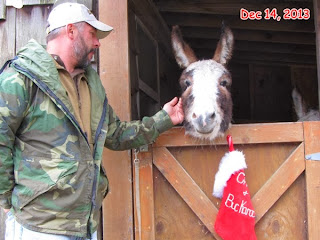in Banner Elk, NC
History Apple Hill Farm started in 2002 with 2 pregnant female alpacas and one young male alpaca. We are now home to 22 alpacas. In addition to alpacas, we have added horses (some of ours, and some who board), llamas, goats, donkeys, chickens, dogs and cats. We strongly believe that animals need a purpose, so every animal on the farm has a stated job or position. Our animals are treated with great care, respect and love.
The animals have their own unique ways of welcoming visitors to Apple Hill. Jack and Maw, our full sized donkeys, bray loudly and then snort to herald arrivals. Hannah, our quarter horse mare, bops her lips together to beg for carrots and treats, and July Moon, our friendliest alpaca, will lay at your feet so you can feel her fiber.
Our passion is empowering people to develop a new and deeper connection with animals.
***********************************************************************
The animals have their own unique ways of welcoming visitors to Apple Hill. Jack and Maw, our full sized donkeys, bray loudly and then snort to herald arrivals. Hannah, our quarter horse mare, bops her lips together to beg for carrots and treats, and July Moon, our friendliest alpaca, will lay at your feet so you can feel her fiber.
Our passion is empowering people to develop a new and deeper connection with animals.
***********************************************************************
I brought two Nigerian Dwarf doelings to Lee Ann in exchange for
http://www.flgfarms.com/flg-bath--body-products.html
http://www.flgfarms.com/flg-bath--body-products.html
which supplied me with Christmas gifts for family and friends.
Jane "Lee" Rankin
is the owner of Apple Hill Farm
and author of this book.
http://www.amazon.com/Cookin-Up-Storm-2nd-ED/dp/0965738728
and author of this book.
http://www.amazon.com/Cookin-Up-Storm-2nd-ED/dp/0965738728
Alpacas are native to Peru, Bolivia and Chile. For the last 20 or so years, alpacas have been living on farms and ranches all over the United States. Alpacas are raised for two main purposes: their beautiful fiber and their market value as breeding livestock. There are 22 different natural fiber colors, from black, to grey, to white and all shades of brown. Alpacas have the most natural fiber colors of any animal used for fiber in the world! Alpacas are sheared once a year to harvest around 5-8 pounds of fiber per animal. The fibers are soft and have a hollow core. When spun and knit into sweaters, scarves or socks, the fibers provide insulation without being hot and do not hold moisture or odor. On top of that, they have a luxurious softness! Alpaca fiber is also considered to be hypoallergenic because it does not contain lanolin (found in wool), or other allergens.
me - girl, you can slow down on the hair gel
Sandy Henderson of
http://buttermilkacrestn.blogspot.com/
http://buttermilkacrestn.blogspot.com/
Ferg visits with the donkeys, Chip and Buckaroo
headed to the Apple Hill Store
There are fiber goats, meat goats, and dairy goats.
Below are meat goats, and
BooneDocksWilcox has dairy goats
BooneDocksWilcox has dairy goats
I found this video online






















No comments:
Post a Comment